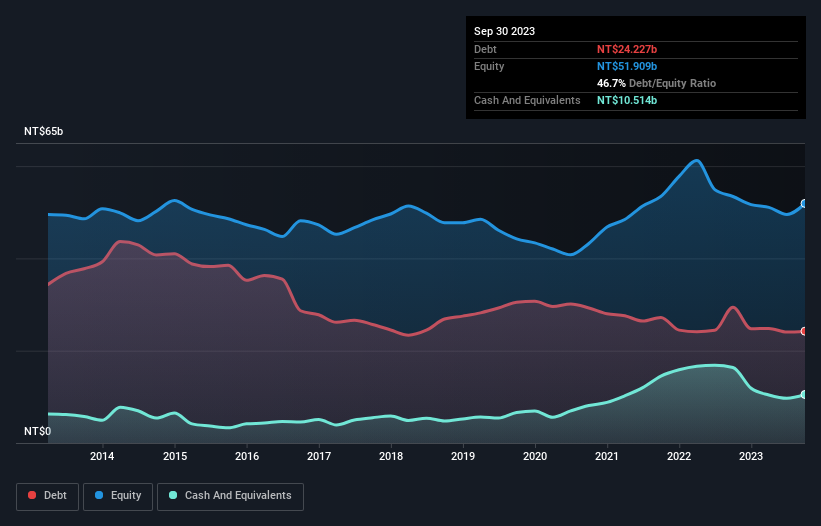Would Taiwan Glass Ind (TWSE:1802) Be Better Off With Less Debt?

The external fund manager backed by Berkshire Hathaway's Charlie Munger, Li Lu, makes no bones about it when he says 'The biggest investment risk is not the volatility of prices, but whether you will suffer a permanent loss of capital.' So it might be obvious that you need to consider debt, when you think about how risky any given stock is, because too much debt can sink a company. We can see that Taiwan Glass Ind. Corp. (TWSE:1802) does use debt in its business. But should shareholders be worried about its use of debt?
What Risk Does Debt Bring?
Debt assists a business until the business has trouble paying it off, either with new capital or with free cash flow. Ultimately, if the company can't fulfill its legal obligations to repay debt, shareholders could walk away with nothing. However, a more usual (but still expensive) situation is where a company must dilute shareholders at a cheap share price simply to get debt under control. Of course, the upside of debt is that it often represents cheap capital, especially when it replaces dilution in a company with the ability to reinvest at high rates of return. The first step when considering a company's debt levels is to consider its cash and debt together.
See our latest analysis for Taiwan Glass Ind
What Is Taiwan Glass Ind's Debt?
The image below, which you can click on for greater detail, shows that Taiwan Glass Ind had debt of NT$24.2b at the end of September 2023, a reduction from NT$29.4b over a year. On the flip side, it has NT$10.5b in cash leading to net debt of about NT$13.7b.

How Healthy Is Taiwan Glass Ind's Balance Sheet?
We can see from the most recent balance sheet that Taiwan Glass Ind had liabilities of NT$33.6b falling due within a year, and liabilities of NT$7.59b due beyond that. On the other hand, it had cash of NT$10.5b and NT$14.3b worth of receivables due within a year. So its liabilities outweigh the sum of its cash and (near-term) receivables by NT$16.3b.
Taiwan Glass Ind has a market capitalization of NT$52.9b, so it could very likely raise cash to ameliorate its balance sheet, if the need arose. However, it is still worthwhile taking a close look at its ability to pay off debt. There's no doubt that we learn most about debt from the balance sheet. But it is Taiwan Glass Ind's earnings that will influence how the balance sheet holds up in the future. So when considering debt, it's definitely worth looking at the earnings trend. Click here for an interactive snapshot.
Over 12 months, Taiwan Glass Ind made a loss at the EBIT level, and saw its revenue drop to NT$45b, which is a fall of 2.1%. We would much prefer see growth.
Caveat Emptor
Over the last twelve months Taiwan Glass Ind produced an earnings before interest and tax (EBIT) loss. Indeed, it lost NT$2.1b at the EBIT level. Considering that alongside the liabilities mentioned above does not give us much confidence that company should be using so much debt. So we think its balance sheet is a little strained, though not beyond repair. However, it doesn't help that it burned through NT$752m of cash over the last year. So suffice it to say we do consider the stock to be risky. For riskier companies like Taiwan Glass Ind I always like to keep an eye on the long term profit and revenue trends. Fortunately, you can click to see our interactive graph of its profit, revenue, and operating cashflow.
If you're interested in investing in businesses that can grow profits without the burden of debt, then check out this free list of growing businesses that have net cash on the balance sheet.
Valuation is complex, but we're here to simplify it.
Discover if Taiwan Glass Ind might be undervalued or overvalued with our detailed analysis, featuring fair value estimates, potential risks, dividends, insider trades, and its financial condition.
Access Free AnalysisHave feedback on this article? Concerned about the content? Get in touch with us directly. Alternatively, email editorial-team (at) simplywallst.com.
This article by Simply Wall St is general in nature. We provide commentary based on historical data and analyst forecasts only using an unbiased methodology and our articles are not intended to be financial advice. It does not constitute a recommendation to buy or sell any stock, and does not take account of your objectives, or your financial situation. We aim to bring you long-term focused analysis driven by fundamental data. Note that our analysis may not factor in the latest price-sensitive company announcements or qualitative material. Simply Wall St has no position in any stocks mentioned.
About TWSE:1802
Taiwan Glass Ind
Engages in the manufacturing, processing, and selling of various glass products in Taiwan, China, and internationally.
Excellent balance sheet and overvalued.
Similar Companies
Market Insights
Community Narratives




